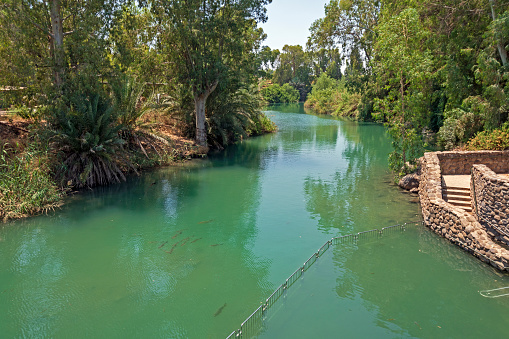“Go therefore and make disciples of all nations, baptizing them in the name of the Father and of the Son and of the Holy Spirit,” (Matthew 28: 19, ESV).
Introduction
Continuing the series on refuting baptismal regeneration passages, we move to the Great Commission.[1]In an email conversation, Andrew Rappaport asked Church of Christ minister Norm Fields about his view on if baptism saves people. Preacher Norm said it does, and referred to Matthew 28:18-20 as support for his claim. As Andrew mentioned in the last thirty minutes of Apologetics Live, the verse mentions nothing about if baptism regenerated anyone.[2] The passage is about Jesus having all authority and to make disciples. This article will examine what the passage says and the immediate context to see who is right.
What the Passage Says
As can be seen above, the passage has a main clause and a dependent clause. The main clause is “Go therefore and make disciples of all nations,” and the dependent clause is, “baptizing them in the name of the Father and of the Son and of the Holy Spirit,” (Matthew 28: 19, ESV). This is easily seen in the English translation. It should also be noted that the passage does not say baptism and teaching are what makes disciples. It also does not say that baptism regenerates or saves anyone. The command is simply to make disciples, baptism is what follows making disciples.
The Greek makes it more precise. The word for “make disciples” is the word “μαθητεύσατε.” It is in the aorist active imperative. The Aorist tense describes a completed action, while the active tense describes something the disciples are doing themselves, and the imperative tense is a command the disciples are expected to do. It is the main verb. It takes priority in the sentence.
The participles following the word “μαθητεύσατε” are “baptizing” and “teaching.” While these participles carry some imperatival weight, they follow the main verb and are not considered to be a part of it. The Exegetical Bible Commentary explains this rule best:
The syntax of the Greek participles for “baptizing” and “teaching” forbids the conclusion that baptizing and teaching are to be construed solely as the means of making disciples, but their precise relationship to the main verb is not easy to delineate. Neither participle is bound to the other or to the main verb with the conjunction kai or a particle, and therefore “they must be viewed as dependent on one another or depending in differing ways on the chief verb” (Beasley-Murray, Baptism, p. 89, cf. BDF, par. 421). Most likely some imperative force is present, since the disciples are certainly to baptize and teach; but computer studies of the Greek NT have shown that although a participle dependent on an imperative normally gains imperatival force when it precedes the imperative, its chief force is not normally imperatival when it follows the imperative … Similarly baptizing and teaching are not the means of making disciples, but they characterize it. Envisaged is that proclamation of the gospel that will result in repentance and faith, for mathēteuō (“I disciple”) entails both preaching and response.[3]
To put it a different way, baptizing and teaching are not what makes disciples. Yet, they are an important component of evangelism and response to the gospel. Proclaiming the gospel and teaching all Christ commanded are important in evangelism but they don’t save anyone unless it is received by faith (Romans 1:16-17). Baptism doesn’t save anyone, but is an integral part of sanctification and identifying with Christ’s death and resurrection (Romans 6: 1–11).
Immediate Context
The context makes it less likely that Jesus is saying baptism saves anyone. The event starts in verse 16 when the disciples come to see Jesus in Galilee to hear some final instruction (Matthew 28: 16 – 20). Let’s look at the whole passage:
Now the eleven disciples went to Galilee, to the mountain to which Jesus had directed them. And when they saw him they worshiped him, but some doubted. And Jesus came and said to them, “All authority in heaven and on earth has been given to me. Go therefore and make disciples of all nations, baptizing them in the name of the Father and of the Son and of the Holy Spirit, teaching them to observe all that I have commanded you. And behold, I am with you always, to the end of the age” (Matthew 28: 16 – 20, ESV).
The event goes like this. The disciples go to Galilee on a mountain where Jesus told them to go (v. 16). Most of the disciples believed it was Jesus and gave the appropriate response of worship (v. 17). Jesus anticipated their response of doubt, and reassured them by declaring all authority everywhere has been bestowed upon Him (v. 18). In light of this, Jesus gives the imperative to make disciples of all ethnicities while going (v. 19a). Making disciples will be done in correlation to, on their part, by going, baptizing, and teaching; none of which are commands, but rather activities which will be done in correlation to the process (vv. 19b – 20a). This will be done by the power of Christ because He will be with them (v. 20b).
There is nothing in this passage about baptism saving disciples. It is rather a declaration of Christ’s authority. The command in response to this declaration is to make disciples. The command can be done because of Jesus’s promise to be with the disciples.
Conclusion
When baptismal regenerationists pick out a passage like this to support their view that water baptism is necessary for salvation, they are grasping for straws. Norm once again proves that he is blinded by the traditions of the Church of Christ doctrine implemented by Walter Scott, Alexander Campbell, and Daniel Sommer. He needs God to open his eyes to the truth. We need to pray for him and all who are blinded by this teaching.
Salvation is by grace through faith alone. As Paul says, “For by grace you have been saved through faith. And this is not your own doing; it is the gift of God, not a result of works, so that no one may boast” (Ephesians 2:8-9, ESV).
If you want to dive deeper in your understanding in biblical interpretation, check out the resources section at strivingforeternity.org/store. There are tons of biblical resources to help you grow in your faith. Lord bless you.
[1] See https://strivingforeternity.org/what-does-the-water-and-the-spirit-mean-in-john-35-it-might-surprise-you-norm-fields/
[2] Andrew Rappaport, Justin Pierce and Josiah Nichols, “Does Baptism Save?” Apologetics Live, February 17, 2022, Accessed February 21, 2022, https://strivingforeternity.org/apologeticslive/
[3] D. A. Carson, “Matthew,” in The Expositor’s Bible Commentary: Matthew, Mark, Luke, ed. Frank E. Gaebelein, vol. 8 (Grand Rapids, MI: Zondervan Publishing House, 1984), 597.





0 Comments